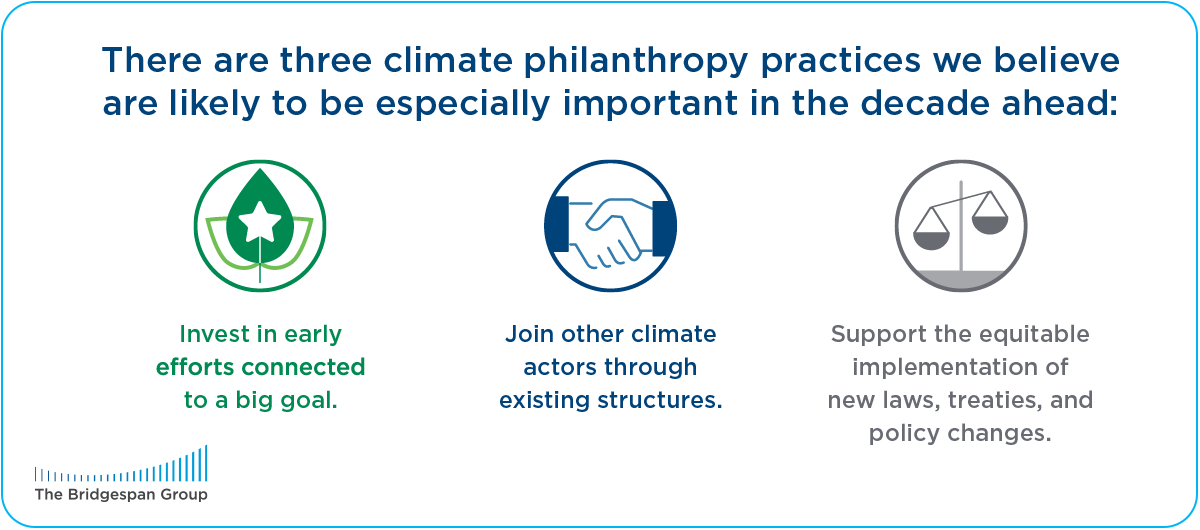Executive Summary
Fires are burning, storms raging, and communities suffering through “once-in-a-century” heat waves across the globe. So it may seem odd to talk about winning on climate change. “We are in the fight of our lives,” UN Secretary-General António Guterres said of the climate crisis in November 2022. “And we are losing.”1
Download the Report
Download a PDF of the full report.Yet, over the past decade, the world has also seen some important climate change advances—beginning to bend the curve of the planet’s future away from the worst-case scenarios imagined just a few years earlier. As the New York Times has noted,2 in 2014 the world was on track to heat up nearly 4 degrees Celsius (7.2 degrees Fahrenheit) from pre-industrial global temperatures by the end of the century. But mitigation efforts since, as we publish this report, have reduced that to a projected warming of 3 degrees Celsius. That’s still a frightening future, to be sure, but it is material progress.
Thinking about winning requires us to keep two apparently opposed ideas in mind—that we are living in a time of escalating peril and crisis, and that, over the next 10 years, major progress against climate change is entirely possible. As a virtuous cycle of wins generates momentum, we can turn the fight around.
Major Climate Wins and Signs of Progress: A Timeline
Our interactive timeline illustrates 39 wins mentioned by at least one of our interviewees for this article. We recognize we might not have captured every major win, yet we believe this is an extensive account of major climate wins of the past two decades—and beyond.This article considers how donors—especially those who are newer to the cause or thinking about how to significantly ramp up their climate philanthropy—can spur progress on climate change over the next decade, building both on established pathways and newer ones.
In interviews with funders, former and current government officials, leaders of climate collaboratives, and frontline leaders around the world, we asked them to name the most significant climate change wins or signs of progress over the past two decades. Two especially interesting insights about climate change and philanthropy jump out from these responses.
First, there were 10 wins or signs of progress collectively named by at least four interviewees—and philanthropy played a significant role in all of them. Those most frequently cited include the Beyond Coal campaign in the United States, which has helped retire approximately two-thirds of coal plants in the nation; the Kigali Amendment to the Montreal Protocol, the 2016 global agreement to dramatically curb the use and production of climate-warming hydrofluorocarbons; the movement for Indigenous peoples and local communities’ land tenure, which has the potential to protect a vast amount of carbon-storing forest and grassland; and the landmark US Inflation Reduction Act, passed in 2022.
Second is the great diversity of the wins and signs of progress. Even with the benefit of hindsight, there was only moderate consensus among our experts about past wins and signs of progress beyond the 10 frequently mentioned ones. Policy wins, technology, market dynamics, and grassroots action all had a role to play in addressing climate change to date—and will continue to do so into the future. Some cited very specific accomplishments, such as the suspension of the Keystone XL pipeline or a reduction in the use of palm oil. Others talked about broader trends like price reductions in renewable energy, which have opened up new opportunities for government action and philanthropic impact. This diversity of perspectives about past wins suggests there’s no current consensus about the most promising pathway for progress against climate change. Yet it also highlights an important opportunity for funders—there are many potential pathways to progress, and all of them will be needed.

Three climate philanthropy practices are likely to be especially important in the decade ahead:
Invest in early efforts connected to a big goal. Given the magnitude of capital that will need to be mobilized, big bets are important. But they often materialize only after many earlier efforts converge.
- In addition to backing big bets, donors can sow the seeds of future progress toward big goals by backing early efforts, many of them small-scale.
- Such efforts can include championing grassroots organizations with deep roots in their communities.
- Early and flexible money is likely to have the greatest impact, even if the path forward is not always clear. Providing flexible resources to organizations and campaigns in early stages, including those with novel strategies, offers the opportunity to prove concepts. Philanthropy can provide risk capital that encourages and enables experimentation and creativity, which can later scale.
Join other climate actors through existing structures. Newer donors to climate philanthropy sometimes tell us that they find the space especially challenging: it’s very complicated, it’s hard to know what will work, and the problem is so big it’s not clear how any single donor can make a difference. But donors in the climate sector don’t have to figure everything out from scratch. There are multiple pathways for fast and potentially high-impact giving. And there are well-established—if often still underfunded and newer—structures for action. Collaboratives and other kinds of intermediaries can provide value to climate donors and climate change efforts in a variety of ways:
- Coordinating strategy and communications
- Allowing funds from multiple donors to be pooled or coordinated for greater impact
- Providing an easy on-ramp to giving for newer donors
- Providing funding and technical support to on-the-ground actors
- Developing and sharing expertise about what works
Support the equitable implementation of laws, treaties, and policy changes. The pathways discussed here—investing in smaller efforts connected to a big goal and working through existing structures for climate action like funder collaboratives and intermediaries—can be used to make progress on one of the biggest opportunities for climate donors over the next decade: supporting the equitable implementation of laws, treaties, and policy changes that have already been enacted. There will be many opportunities for donors to support the equitable implementation of those public-sector advances:
- Donors can fund nonprofits in the United States that help states, counties, municipalities, and communities access new federal funding and use it to reduce emissions and adapt to a changing climate.
- For donors who focus on place, there are tremendous opportunities to help local nonprofits and support on-the-ground implementation.
- Across the globe, there is an extraordinary array of climate innovations being implemented on the ground by communities and grassroots movements that need money to scale.
The complexity and size of the climate issue is no reason for philanthropic money to stay on the sidelines. And while there has been a substantial increase in donor support for climate action, hardly any of the experts we interviewed felt there is currently anything like sufficient private funding to meet the urgency of the moment. Instead, there is a daunting investment gap. The only way to bridge it is to start funding today.






